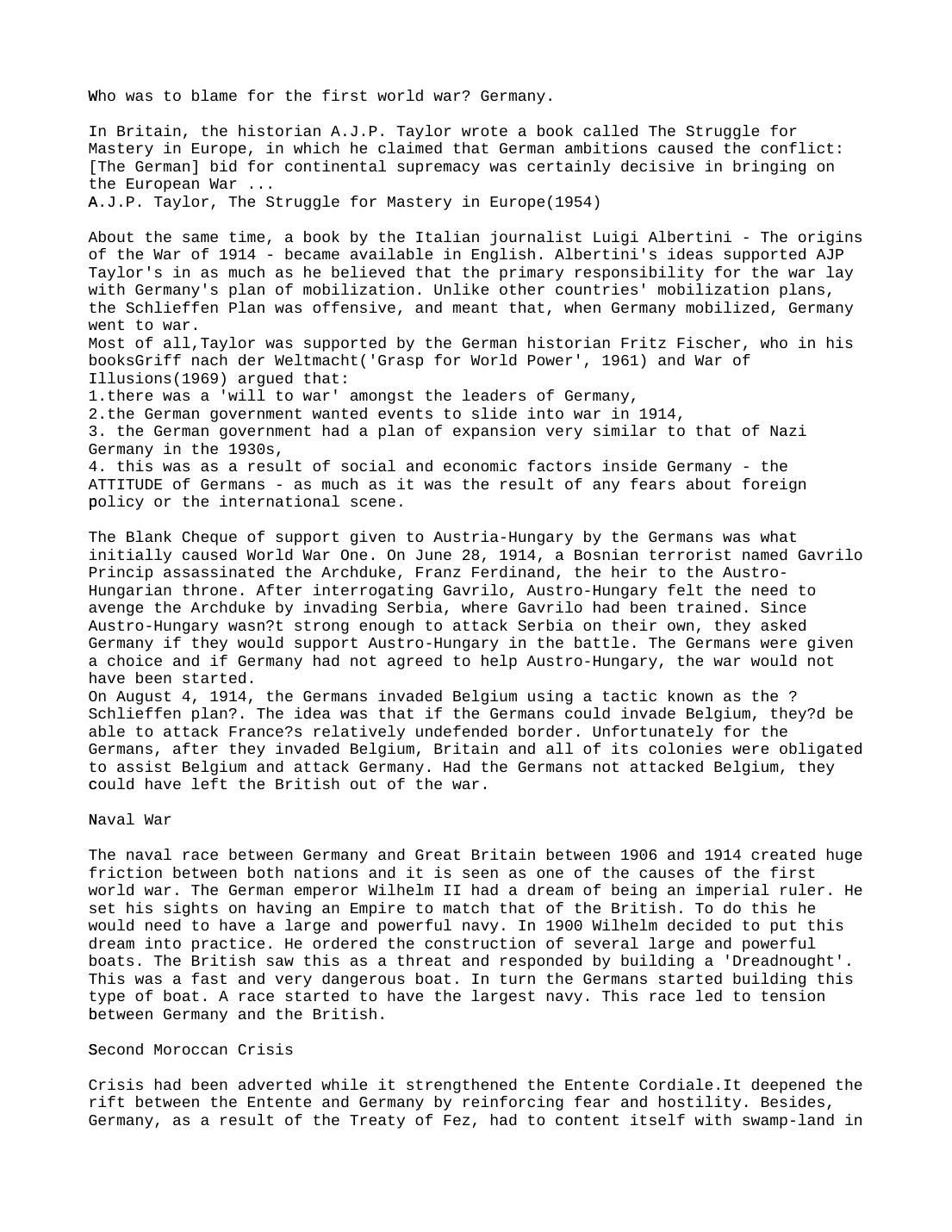le texte
Publié le 17/05/2020
Extrait du document
«
Who was to blame for the first world war? Germany.W
In Britain, the historian A.J.P.
Taylor wrote a book called The Struggle for
Mastery in Europe, in which he claimed that German ambitions caused the conflict:
[The German] bid for continental supremacy was certainly decisive in bringing on
the European War ...
A.J.P.
Taylor, The Struggle for Mastery in Europe(1954)A
About the same time, a book by the Italian journalist Luigi Albertini - The origins
of the War of 1914 - became available in English.
Albertini's ideas supported AJP
Taylor's in as much as he believed that the primary responsibility for the war lay
with Germany's plan of mobilization.
Unlike other countries' mobilization plans,
the Schlieffen Plan was offensive, and meant that, when Germany mobilized, Germany
went to war.
Most of all,Taylor was supported by the German historian Fritz Fischer, who in his
booksGriff nach der Weltmacht('Grasp for World Power', 1961) and War of
Illusions(1969) argued that:
1.there was a 'will to war' amongst the leaders of Germany,
2.the German government wanted events to slide into war in 1914,
3.
the German government had a plan of expansion very similar to that of Nazi
Germany in the 1930s,
4.
this was as a result of social and economic factors inside Germany - the
ATTITUDE of Germans - as much as it was the result of any fears about foreign
policy or the international scene.p
The Blank Cheque of support given to Austria-Hungary by the Germans was what
initially caused World War One.
On June 28, 1914, a Bosnian terrorist named Gavrilo
Princip assassinated the Archduke, Franz Ferdinand, the heir to the Austro-
Hungarian throne.
After interrogating Gavrilo, Austro-Hungary felt the need to
avenge the Archduke by invading Serbia, where Gavrilo had been trained.
Since
Austro-Hungary wasn?t strong enough to attack Serbia on their own, they asked
Germany if they would support Austro-Hungary in the battle.
The Germans were given
a choice and if Germany had not agreed to help Austro-Hungary, the war would not
have been started.
On August 4, 1914, the Germans invaded Belgium using a tactic known as the ?
Schlieffen plan?.
The idea was that if the Germans could invade Belgium, they?d be
able to attack France?s relatively undefended border.
Unfortunately for the
Germans, after they invaded Belgium, Britain and all of its colonies were obligated
to assist Belgium and attack Germany.
Had the Germans not attacked Belgium, they
could have left the British out of the war.c
Naval WarN
The naval race between Germany and Great Britain between 1906 and 1914 created huge
friction between both nations and it is seen as one of the causes of the first
world war.
The German emperor Wilhelm II had a dream of being an imperial ruler.
He
set his sights on having an Empire to match that of the British.
To do this he
would need to have a large and powerful navy.
In 1900 Wilhelm decided to put this
dream into practice.
He ordered the construction of several large and powerful
boats.
The British saw this as a threat and responded by building a 'Dreadnought'.
This was a fast and very dangerous boat.
In turn the Germans started building this
type of boat.
A race started to have the largest navy.
This race led to tension
between Germany and the British.
b
Second Moroccan CrisisS
Crisis had been adverted while it strengthened the Entente Cordiale.It deepened the
rift between the Entente and Germany by reinforcing fear and hostility.
Besides,
Germany, as a result of the Treaty of Fez, had to content itself with swamp-land in.
»
↓↓↓ APERÇU DU DOCUMENT ↓↓↓
Liens utiles
- COMMENTAIRE DE TEXTE : “Stances à Marquise”, Pierre Corneille (1658)
- Commentaire de texte Olympe de Gouges - A partir de « Homme, es tu capable d’être juste ? »
- Commentaire de texte, Bardamu à la guerre de Céline
- ETUDE DE TEXTE : MONOLOGUE DE LUCKY En attendant Godot, Samuel Beckett
- Texte 9. Platon, Gorgias, 456a-456c

































